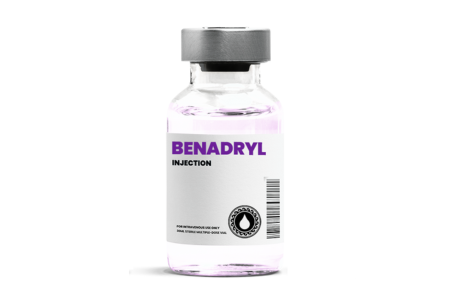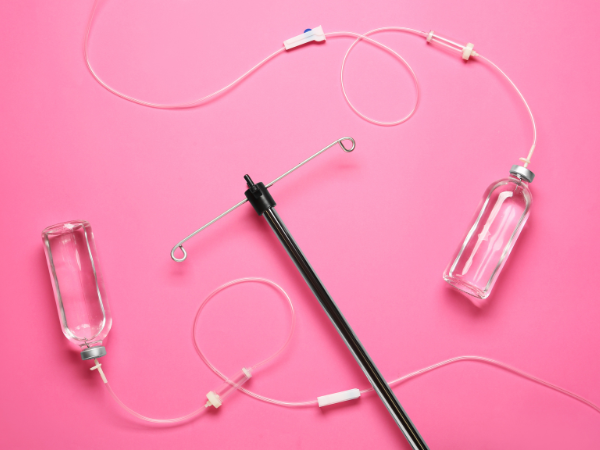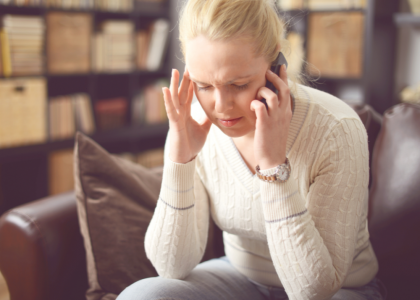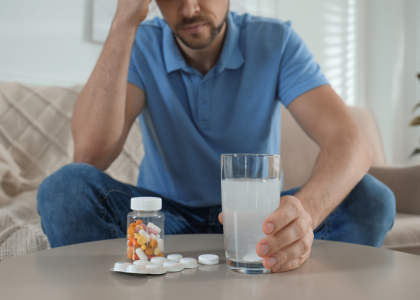Benadryl, an antihistamine, can sometimes alleviate anxiety symptoms. It is not a standard anxiety treatment but may offer temporary relief.
Benadryl, known generically as diphenhydramine, is primarily recognized for treating allergies, but some individuals have found it useful for easing anxiety. It’s essential to understand that Benadryl is not an FDA-approved medication for anxiety and should not replace professional treatments prescribed by a healthcare provider.
The sedative effects of Benadryl can induce calmness, which might help in managing minor anxiety episodes. Nonetheless, it’s crucial to consult with a doctor before using Benadryl for anxiety, as it can cause side effects and is not suitable for everyone. The drug’s non-prescription status and widespread availability make it a tempting option for those seeking quick relief from anxiety, but long-term or frequent use for this purpose is not advisable.
Benadryl’s Mechanism Of Action
Anxiety can be a challenging condition, affecting millions worldwide. Among various remedies, Benadryl, a brand name for diphenhydramine, is often discussed. Benadryl’s mechanism of action is primarily as an antihistamine, but it may also have effects on anxiety symptoms. Let’s delve into how Benadryl works and its potential impact on anxiety.
Antihistamine Properties
Benadryl is widely recognized for its antihistamine properties. Histamine is a chemical involved in immune responses, but it also plays a role in wakefulness. Here’s how Benadryl operates:
- Blocks histamine receptors: Benadryl attaches to histamine-1 (H1) receptors in the body, preventing histamine from exerting its effects.
- Reduces allergic reactions: By blocking these receptors, Benadryl helps alleviate symptoms like runny nose, itching, and hives.
- Induces drowsiness: The blocking of H1 receptors can lead to sedation, which is why Benadryl is also used as a sleep aid.
This sedative effect can indirectly influence anxiety levels. The table below summarizes the relationship between Benadryl’s antihistamine action and anxiety:
| Action | Effect on Anxiety |
|---|---|
| Histamine Receptor Blocking | Potential reduction in anxiety due to sedation |
| Allergy Symptom Relief | Improved comfort may lead to less anxiety |
| Sedation | May help with sleep issues related to anxiety |
Impact On Anxiety Symptoms
The impact of Benadryl on anxiety symptoms is an off-label use and not its primary function. However, its sedative properties can indirectly affect anxiety in the following ways:
- Sedation: The drowsiness caused by Benadryl might help individuals relax and potentially ease their anxiety.
- Sleep improvement: By promoting sleep, Benadryl can help those with anxiety who struggle with insomnia.
- Short-term relief: The calming effect may provide temporary respite from acute anxiety episodes.
It’s important to note that while Benadryl may help with certain aspects of anxiety, it is not a long-term solution. The following points outline the implications of using Benadryl for anxiety symptoms:
| Aspect | Implication |
|---|---|
| Not a primary treatment | Benadryl is not approved for anxiety management. |
| Side effects | Possible side effects include dry mouth, blurred vision, constipation, and cognitive impairment. |
| Tolerance and dependence | Repeated use can lead to tolerance and even dependence. |

Benadryl IV
Benadryl, known generically as diphenhydramine, is a widely used antihistamine that offers quick relief from various allergic symptoms, such as itching, hives, and swelling.
The Controversy
Many people wonder if Benadryl, a common allergy medication, can help with anxiety. This topic brings lots of controversy. Let’s dive into why people are talking about it.
Mixed Research Findings
Research on Benadryl for anxiety shows mixed results. Some studies suggest it might help because it makes people drowsy. This can feel like it’s reducing anxiety. But, not all experts agree. Here’s a closer look:
- Some people feel calmer after taking Benadryl.
- Others don’t notice any change in their anxiety levels.
Let’s look at a simple table comparing findings:
| Study | Findings |
|---|---|
| Study A | Benadryl helped reduce anxiety in 30% of participants. |
| Study B | No significant change in anxiety levels. |
So, it’s clear that results vary greatly. It’s important to talk to a doctor before using Benadryl for anxiety.
Potential Risks And Side Effects
Using Benadryl for anxiety comes with risks and side effects. While it might seem like an easy solution, it’s not without its problems. Here are some key points:
- Drowsiness can be strong and affect daily tasks.
- It might lead to dependence if used often.
- Some people experience dry mouth, dizziness, or blurred vision.
Here’s a breakdown of common side effects:
| Side Effect | Frequency |
|---|---|
| Drowsiness | Very Common |
| Dry Mouth | Common |
| Dizziness | Sometimes |
| Blurred Vision | Rare |
It’s clear that while Benadryl might offer short-term relief, it’s not a long-term solution for anxiety. Always consult a healthcare provider for advice tailored to your needs.

Practical Considerations
Anxiety can be a tough challenge for many. It often leads to the search for quick relief. One such quick fix that some consider is Benadryl, known for its use in allergies. Yet, can it help with anxiety? Let’s dive into the practical considerations for using Benadryl as an anxiety aid.
Consulting A Healthcare Professional
Before reaching for Benadryl, it’s crucial to talk with a doctor. They understand your health best. Here are key points to consider:
- Medical History: Your doctor will check if Benadryl is safe for you.
- Drug Interactions: They’ll ensure it won’t mix badly with other meds.
- Proper Dosage: They can tell you how much to take.
Benadryl’s active ingredient, diphenhydramine, can cause drowsiness. It’s not a long-term fix for anxiety. Plus, it may lead to other issues like:
| Side Effect | Impact |
|---|---|
| Drowsiness | Can interfere with daily tasks |
| Dry Mouth | Uncomfortable and may cause bad breath |
| Blurred Vision | Makes driving and reading hard |
Always remember, a healthcare pro is your guide. They help you understand if Benadryl is a smart choice for your anxiety.
Alternative Treatment Options
If Benadryl isn’t right, many other ways can help ease anxiety. Look at these alternatives:
- Therapy: Talking to a therapist can offer long-term relief.
- Relaxation Techniques: Methods like deep breathing or yoga can calm your mind.
- Exercise: Physical activity boosts mood and reduces stress.
Medication is another route. Safe options might include:
| Medication Type | Use |
|---|---|
| SSRIs | For long-term anxiety management |
| Benzodiazepines | For short-term or acute anxiety relief |
| Beta-Blockers | For physical symptoms of anxiety |
Remember, these meds are by prescription only. Your doctor can advise what’s best for you. Lifestyle changes can also play a big role in managing anxiety. Eating well, sleeping enough, and staying connected with loved ones are key. Let’s face it, there’s no one-size-fits-all for anxiety relief. Explore options and find what fits your life best with expert advice.
Personal Experiences
Many people seek relief from anxiety, and some turn to over-the-counter options like Benadryl. Personal experiences with Benadryl for anxiety vary widely. These stories can shed light on potential benefits and risks. Let’s explore real-life accounts to understand more about using Benadryl in this way.
Anecdotal Reports
Individuals with anxiety sometimes reach for Benadryl, known for its sedative effects. Here are a few anecdotal reports from those who have tried it:
- Temporary Relief: Some find that Benadryl helps to ease their anxiety symptoms temporarily.
- Sleep Aid: Others use Benadryl to promote sleep, which can indirectly improve anxiety by ensuring better rest.
These experiences suggest that Benadryl might offer short-term relief for some, but it’s not a one-size-fits-all solution. Below is a table summarizing key points from personal stories:
| Effectiveness | Duration | Side Effects |
|---|---|---|
| Mixed | Short-term | Drowsiness, Dry Mouth |
| Note: Experiences vary greatly among individuals. | ||
Cautionary Tales
However, not all experiences with Benadryl for anxiety are positive. Here are some cautionary tales:
- Dependency: Regular use can lead to dependence, as the body may get used to the sedative effects.
- Diminishing Returns: Over time, the effectiveness of Benadryl can decrease, requiring higher doses for the same effect.
It’s important to approach Benadryl with caution, as these stories highlight potential concerns. Consider the following table, which outlines common warnings from personal accounts:
| Dependency Risk | Effectiveness Over Time | Notable Side Effects |
|---|---|---|
| Yes | Decreases | Increased Tolerance, Withdrawal Symptoms |
| Note: Long-term use is not recommended without a doctor’s advice. | ||
These experiences serve as a reminder to use Benadryl cautiously and to seek professional medical advice for managing anxiety.
Frequently Asked Questions
Will Benadryl Calm My Anxiety?
Benadryl, an antihistamine, may provide temporary relief for mild, non-chronic anxiety symptoms. It’s not an approved treatment for anxiety but can induce drowsiness, potentially helping with relaxation. Always consult a doctor before using it for anxiety management.
Does Benadryl Relax The Nervous System?
Yes, Benadryl has a sedative effect that can relax the nervous system. It blocks histamine, which in turn reduces activity in the central nervous system.
Which Antihistamine Is Best For Anxiety?
Hydroxyzine is often considered the best antihistamine for anxiety due to its effectiveness and sedative properties. Always consult a healthcare professional before starting any medication.
What Is A Natural Anxiety Pill?
A natural anxiety pill typically contains herbal ingredients like valerian root or chamomile, aimed at calming stress without pharmaceuticals. These supplements offer a gentler approach to managing anxiety symptoms.
Conclusion
Wrapping up, Benadryl may offer temporary relief for anxiety symptoms. Yet, it’s not a long-term solution or a substitute for professional treatment. Always consult a healthcare provider before using over-the-counter medications for anxiety management. Remember, effective anxiety strategies go beyond quick fixes to ensure lasting wellbeing.






